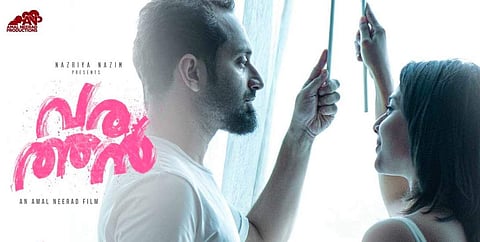Varathan Review: A blistering and immensely satisfying revenge thriller
Rating:(4.5 / 5)
When the first footage of Varathan landed online, some viewers speculated that the film was a remake of Sam Peckinpah's Straw Dogs (1971). After having seen Varathan, I can confirm that the basic plotline has indeed been influenced by that film. But one must separate Amal Neerad's film from its influences--there are more than one--and see it as a separate film with its own distinct look. Compared to the Sam Peckinpah film's vicious and dizzyingly unsettling depiction of violence, Varathan's violence is more palatable and family-friendly. Amal Neerad transplants the same story to Kerala with most of the brutality removed but none of the tension.
And Fahadh Faasil's Abi is a far cry from Dustin Hoffman in terms of looks. While Hoffman's character is a nerdy-looking schoolteacher, Abi is a super-stylish, metrosexual dude straight out of GQ magazine. What is similar between Hoffman's and Abi's characters, however, is that they both are perceived as weak by their better halves. As the film opens, Abi has been laid off from his plush Dubai job; and when he goes home later, he is greeted by the news of his wife Priya's (Aishwarya Lekshmi) miscarriage. During a dinner date, she suggests moving to an isolated hill station in her hometown in Kerala, where her ancestors had long ago built a quaint home.
Director: Amal Neerad
Cast: Fahadh Faasil, Aishwarya Lekshmi, Sharaf U Dheen, Dileesh Pothan
When they finally land, they sense trouble brewing in the form of the sexually repressed locals who can't stand the sight of the couple walking hand-in-hand. Whether they're married or not is irrelevant; they're not supposed to do anything that even remotely disrupts their libido. Abi gets a first-hand visual of this when another couple is subjected to humiliation for discreetly spending a romantic afternoon in their car.
On the other hand, the lecherous looks from all directions make Priya increasingly uneasy. To make matters worse, a couple of distasteful incidents happen. First, her undergarments go missing, and then a concealed phone is discovered outside their bathroom window. And by photographing both Abi and Priya in a glamorous way, Amal Neerad cleverly makes the audience complicit, making them aware of their gaze as well.
The film's title, which means 'outsider', can be a reference to either Abi or the locals. There is a rich baron (Nishthar Seth) and his sons who walk around as if they own the entire land; they make it clear to Abi and Priya that certain rules of decorum are to be maintained if they wish to live there peacefully. It doesn't take long before we are introduced to the baron's prominent son Joyce (a terrific, uncomfortably creepy, and cast-against-type Sharaf U Dheen).
It becomes apparent that Joyce, who studied in the same school as Priya, still harbours lustful thoughts about her. And upon learning this, his equally creepy friends (Arjun Ashokan and Vijilesh in brave performances), start to harbour the same fantasies. And Abi's inaction and his non-violent stance make him, in their eyes, unworthy of Priya's affections. Joyce is constantly picturing himself as the ideal man for her. Needless to say, the threat of sexual violence looms large.
When it finally happens, Amal Neerad thankfully keeps it off-screen, with the intensity left vague. But this is not the first instance of sexual violence if you count the number of times the men have undressed her with their eyes. When Priya comes out of this nasty episode, she is furious at Abi for not taking the necessary action earlier, when the men made several attempts to invade her privacy.
Being a technically proficient filmmaker, Amal Neerad is in full command of his craft here. Usually criticised for his excessive use of slow motion in his earlier work, he is commendably restrained here, employing slow motion only when necessary. He saves most of it for the film's blistering finale, where Abi undergoes a transformation worthy of multiple claps. Though this transformation is not entirely convincing, we are willing to overlook it given the satisfyingly cathartic mayhem that follows.
As in Iyobinte Pusthakam, Amal gives Fahadh a full-fledged mass avatar befitting his personality. When Abi comes up with ingenious ways to disarm the bad guys, the resultant spectacle is nothing but pure cinematic delight. At one point, one of the bad guys asks, "What work did he do in Dubai again?" We are asking ourselves the same question, wondering whether Abi had a double life we aren't aware of. And Aishwarya Lekshmi gets her own mass moment too. If the couple seemed slightly distanced from each other earlier, they couldn't get any closer now. It's a beautiful marriage forged by the rigours of hell.
After Parava and Koode, cinematographer Littil Swayamp shows no sign of slowing down. He continues to churn out one marvellous frame after another. His compositions, aided by editor Vivek Harshan, are crisp and elegant, even when things get intensely chaotic. And Sushin Shyam's ominous background score effectively accentuates the escalating menace. This is one blistering and immensely satisfying revenge thriller.

